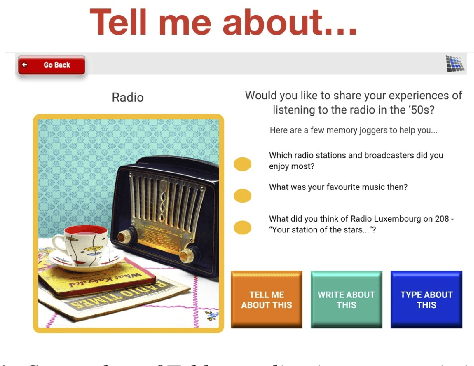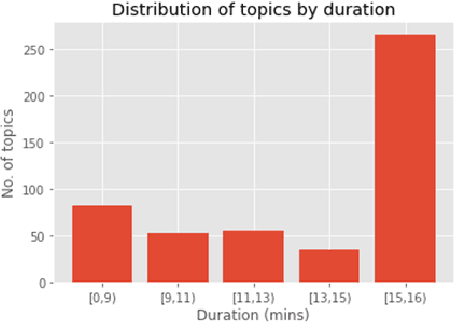Maria Wolters
A Longitudinal Multi-modal Dataset for Dementia Monitoring and Diagnosis
Sep 03, 2021



Abstract:Dementia is a family of neurogenerative conditions affecting memory and cognition in an increasing number of individuals in our globally aging population. Automated analysis of language, speech and paralinguistic indicators have been gaining popularity as potential indicators of cognitive decline. Here we propose a novel longitudinal multi-modal dataset collected from people with mild dementia and age matched controls over a period of several months in a natural setting. The multi-modal data consists of spoken conversations, a subset of which are transcribed, as well as typed and written thoughts and associated extra-linguistic information such as pen strokes and keystrokes. We describe the dataset in detail and proceed to focus on a task using the speech modality. The latter involves distinguishing controls from people with dementia by exploiting the longitudinal nature of the data. Our experiments showed significant differences in how the speech varied from session to session in the control and dementia groups.
Does "AI" stand for augmenting inequality in the era of covid-19 healthcare?
Apr 30, 2021Abstract:Among the most damaging characteristics of the covid-19 pandemic has been its disproportionate effect on disadvantaged communities. As the outbreak has spread globally, factors such as systemic racism, marginalisation, and structural inequality have created path dependencies that have led to poor health outcomes. These social determinants of infectious disease and vulnerability to disaster have converged to affect already disadvantaged communities with higher levels of economic instability, disease exposure, infection severity, and death. Artificial intelligence (AI) technologies are an important part of the health informatics toolkit used to fight contagious disease. AI is well known, however, to be susceptible to algorithmic biases that can entrench and augment existing inequality. Uncritically deploying AI in the fight against covid-19 thus risks amplifying the pandemic's adverse effects on vulnerable groups, exacerbating health inequity. In this paper, we claim that AI systems can introduce or reflect bias and discrimination in three ways: in patterns of health discrimination that become entrenched in datasets, in data representativeness, and in human choices made during the design, development, and deployment of these systems. We highlight how the use of AI technologies threaten to exacerbate the disparate effect of covid-19 on marginalised, under-represented, and vulnerable groups, particularly black, Asian, and other minoritised ethnic people, older populations, and those of lower socioeconomic status. We conclude that, to mitigate the compounding effects of AI on inequalities associated with covid-19, decision makers, technology developers, and health officials must account for the potential biases and inequities at all stages of the AI process.
Examining the Role of Mood Patterns in Predicting Self-Reported Depressive symptoms
Jun 14, 2020



Abstract:Depression is the leading cause of disability worldwide. Initial efforts to detect depression signals from social media posts have shown promising results. Given the high internal validity, results from such analyses are potentially beneficial to clinical judgment. The existing models for automatic detection of depressive symptoms learn proxy diagnostic signals from social media data, such as help-seeking behavior for mental health or medication names. However, in reality, individuals with depression typically experience depressed mood, loss of pleasure nearly in all the activities, feeling of worthlessness or guilt, and diminished ability to think. Therefore, a lot of the proxy signals used in these models lack the theoretical underpinnings for depressive symptoms. It is also reported that social media posts from many patients in the clinical setting do not contain these signals. Based on this research gap, we propose to monitor a type of signal that is well-established as a class of symptoms in affective disorders -- mood. The mood is an experience of feeling that can last for hours, days, or even weeks. In this work, we attempt to enrich current technology for detecting symptoms of potential depression by constructing a 'mood profile' for social media users.
 Add to Chrome
Add to Chrome Add to Firefox
Add to Firefox Add to Edge
Add to Edge